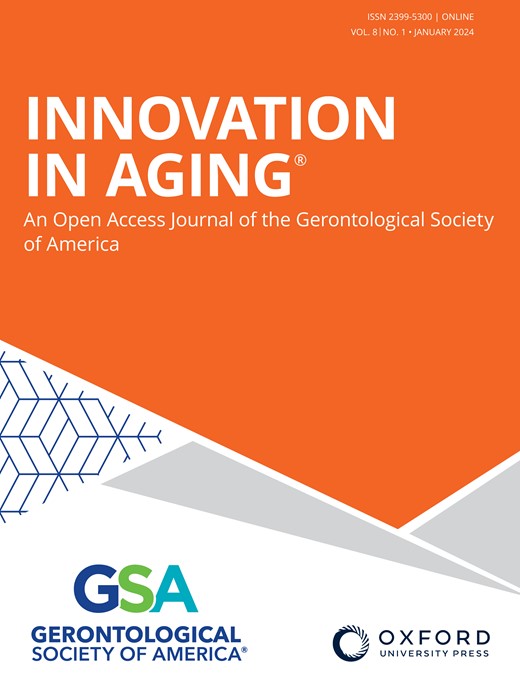将跨专业教育纳入社区卫生合作,促进实践变革
IF 4.9
3区 医学
Q1 GERIATRICS & GERONTOLOGY
引用次数: 0
摘要
摘要 新泽西州老年妇女教育项目与罗格斯大学护理学院-卡姆登分校、斯托克顿大学、新泽西州住房和抵押贷款金融局以及位于服务欠缺社区的四个经济适用房站点合作,开展了一项跨专业社区/公共卫生倡议,有可能惠及约 600 名老年居民。为来自多个健康专业学科的教师、学生和员工提供的 IPE 课程,帮助他们做好准备,使用 4Ms 框架(重要事项、精神、药物、行动能力)对有慢性健康问题的居民进行评估,并针对多重复杂性增加老年医学第 5 M。学生和教职员工利用居民健康风险评估(RHRA),通过获取支持 "居家养老 "所需的关键信息来评估居民的健康/生物心理社会需求,从而制定以人为本的护理计划,解决保持独立、健康和转介所需服务/支持的问题,以延迟或防止机构安置。从 2019 年到 2022 年,来自多个学科(如护理、社会工作、咨询、OT)的 84 名学生参加了社区轮转,完成了 279 次 RHRA,并制定了 101 个 IPE 案例审查和以人为本的护理计划。评估住院患者的并发症(高血压 46%、糖尿病 42%、精神健康 40%;每位住院患者服用 8.6 种药物,44% 的迷你慢动作 <3;19% PHQ+,51% + 跌倒筛查;48% TUG>12;58% ADL/IADL 缺陷)突出了第 5 个 M,即多重复杂性。IPE 是培训医疗保健人员的可持续途径,它承认/重视以人为本的方法,并鼓励学习其他学科的角色和责任。2022 年实施的定制数据库有助于纵向跟踪与居民需求、转诊、干预、获得服务以支持居家养老相关的成果,并为政策和实践变革提供信息。本文章由计算机程序翻译,如有差异,请以英文原文为准。
FOSTERING PRACTICE CHANGE BY INTEGRATING INTERPROFESSIONAL EDUCATION IN A COMMUNITY HEALTH COLLABORATION
Abstract NJGWEP undertook an interprofessional community/public health initiative collaborating with Rutgers University School of Nursing-Camden, Stockton University, NJ Housing and Mortgage Finance Agency, and four affordable housing sites located in underserved communities, with a potential to reach approximately 600 older residents. An IPE curriculum delivered to faculty, students, and staff from multiple health professions disciplines prepares them for assessing residents with chronic health problems using the 4Ms framework (What Matters, Mind, Medications, Mobility), adding the Geriatric 5th M for multi-complexity. Using a Resident Health Risk Assessment (RHRA) to assess residents’ health/biopsychosocial needs by capturing critical information needed to support “aging in place,” students and staff develop person-centered plans of care that address maintenance of independence, health, and referral to needed services/supports to delay or prevent institutional placement. From 2019-2022, 84 students from multiple disciplines (i.e., nursing, social work, counseling, OT) participated in community-based rotations, completed 279 RHRAs, and developed 101 IPE case reviews and person-centered plans of care. Evaluating residents’ co-morbid conditions (Hypertension 46%, Diabetes Mellitus 42%, Mental Health 40%; 8.6 medications per/resident, 44% Mini-Cog < 3; 19% PHQ+, 51% + Falls Screen; 48% TUG>12; 58% ADL/IADL deficits) highlighted the 5th M, Multi-Complexity. IPE is a sustainable venue for training a health care workforce that acknowledges/values the person-centered approach and encourages learning the roles and responsibilities of other disciplines. Implementation of a customized database in 2022 facilitates longitudinal tracking of outcomes related to resident needs, referrals, interventions, access to services to support aging in place, and informs policy and practice change.
求助全文
通过发布文献求助,成功后即可免费获取论文全文。
去求助
来源期刊

Innovation in Aging
GERIATRICS & GERONTOLOGY-
CiteScore
4.10
自引率
0.00%
发文量
72
审稿时长
15 weeks
期刊介绍:
Innovation in Aging, an interdisciplinary Open Access journal of the Gerontological Society of America (GSA), is dedicated to publishing innovative, conceptually robust, and methodologically rigorous research focused on aging and the life course. The journal aims to present studies with the potential to significantly enhance the health, functionality, and overall well-being of older adults by translating scientific insights into practical applications. Research published in the journal spans a variety of settings, including community, clinical, and laboratory contexts, with a clear emphasis on issues that are directly pertinent to aging and the dynamics of life over time. The content of the journal mirrors the diverse research interests of GSA members and encompasses a range of study types. These include the validation of new conceptual or theoretical models, assessments of factors impacting the health and well-being of older adults, evaluations of interventions and policies, the implementation of groundbreaking research methodologies, interdisciplinary research that adapts concepts and methods from other fields to aging studies, and the use of modeling and simulations to understand factors and processes influencing aging outcomes. The journal welcomes contributions from scholars across various disciplines, such as technology, engineering, architecture, economics, business, law, political science, public policy, education, public health, social and psychological sciences, biomedical and health sciences, and the humanities and arts, reflecting a holistic approach to advancing knowledge in gerontology.
 求助内容:
求助内容: 应助结果提醒方式:
应助结果提醒方式:


